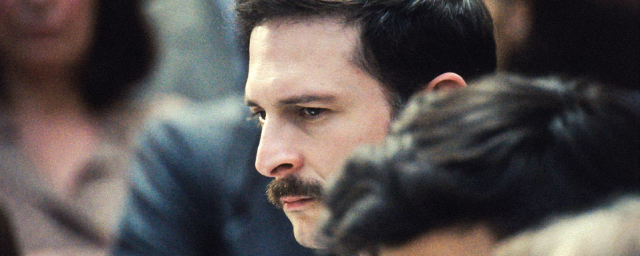At the cinema, “The Goldman Trial” by Cédric Kahn looks back on the affair of Pierre Goldman, half-brother of Jean-Jacques Goldman and far-left activist prosecuted for robberies and murders in the 70s. We recommend this closed session exceptional.
What is it about ?
In November 1975, the second trial began of Pierre Goldman, a far-left activist, sentenced at first instance to life imprisonment for four armed robberies, one of which resulted in the death of two pharmacists. He proclaims his innocence in this latest affair and in a few weeks becomes the icon of the intellectual left. Georges Kiejman, a young lawyer, defends him. But very quickly, their relationship becomes strained. Goldman, elusive and provocative, risks the death penalty and makes the outcome of the trial uncertain.
One of the biggest trials of the 1970s told behind closed doors
Presented at the opening of the Filmmakers’ Fortnight at the Cannes Film Festival, The Goldman Trial is the new film by Cédric Kahn (Roberto Succo, A Better Life, La Prière) which looks back on the second trial of Pierre Goldman, a famous intellectual who evolved into banditry in the 1970s.
Sentenced at first instance to criminal imprisonment for robberies, one of which led to the death of two pharmacists, the activist and criminal born in 1944 was in the spotlight during his second trial, which began in November 1975 and ended in May 1976. Claiming his innocence, Pierre Goldman is an elusive and irreverent spirit who gives his lawyer Georges Kiejman a hard time.
Releases, news, interviews… Find all the latest news on Indie films
Inspired by the book Obscure memories of a Polish Jew born in France by Pierre Goldman that he read “at least 15 or 20 years ago”the director plunges us into an immersive camera, as suffocating and exciting – and shot in 4/3 -, which dissects the unleashed passions of the different protagonists linked directly or indirectly to the affair. “The spirit of the film is capture”explained Cédric Kahn, met during the Quinzaine des Cinéastes.
“Often, I found that the best takes were the first ones. Then afterwards, there were things that came back. There were the reactions of the audience which were very spontaneous in the first takes. And then, there were also a fight to assert themselves, because the actors were in a kind of arena. And ultimately, the actors were not playing for the camera, it was the camera who was taking the live action.”
Moonshaker
In addition to highlighting one of the biggest trials of the 1970s, The Goldman Trial is also the scene of formidable verbal jousts, brilliantly written and intensely launched by a cast who throw themselves headlong into the exercise, notably Arieh Worthalter (Serre Moi Fort, Bowling Saturne, Le Parfum Vert) in the shoes of Pierre Goldman who delivers a stunning performance as this provocative and enigmatic political figure who divided France.
Another solid performance, that of Arthur Harari (Onoda – 10,000 Nights in the Jungle), in the sensitive shoes of the young lawyer Georges Kiejman. The rest of the cast is also excellent, we can cite Nicolas Briançon (Engrenages), Jeremy Lewin, Chloé Lecerf, Stéphan Guérin-Tillié and Aurélien Chaussade.
The whole story is at stake in the context of the trial and the feature film ignores staging flourishes or complex narrative structure. The director positions us as witnesses to a trial that will mark an era and trusts us as spectators:
“We have the impression that people are hungry for all these codes, the flashbacks, the music, the sounds everywhere, the sound editing, all that. And we realize, when we remove all that, that people are very happy not to be accompanied, that people can accompany themselves while watching a film. It’s just subtraction, but we are so used to having material stuffed with information that in fact, that becomes almost stylistic to not have so many.”
More than the portrait of a man who proclaims his innocence (only for the acts of murder), the film depicts the complexities of a figure – a sort of myth of the intellectual left – who denounces, through his status, that he would like to be a martyr, the excesses of a police-justice system of the 1970s which can easily be compared with those of our contemporary society.

Moonshaker
“It’s interesting. It’s both sad and happy because we always dramatize the moment. Then we realize that the present era resembles the era before, which itself resembles the time before. So there is something that is intrinsic to human nature.
I feel like time hasn’t moved. Finally, there were also two Frances confronting each other in this trial. Fiction is reality, but reality becomes fiction.”
The Goldman Trial is also about the power of language and the force of words, when they are the only attack or defense in a legal case that lacks compelling evidence. The Goldman Trial is a chatty but gripping film, which succeeds in drawing the viewer in and making them live in this trial room with rhythm and a certain enthusiasm.
“When I did The Prayer, I asked myself how I was going to show the invisible since we were talking about belief. For The Goldman Trial, I asked myself how I was going to pay homage to the words. It was really the challenge of directing, of making a film about words, about the power of speech. In the collective unconscious, cinema is the image. But in this specific case, it is a film to to watch and above all to listen.”
Comments collected by Mégane Choquet on May 18, 2023 in Cannes.
The film The Goldman Trial is currently in theaters.
